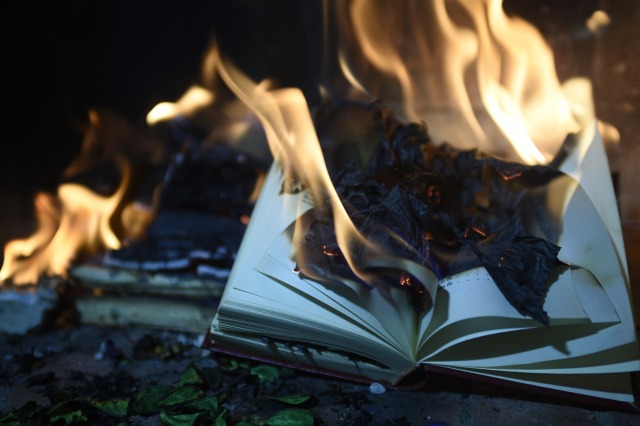Or can this apparently destructive act sometimes be a force for good?
The furore over the quran burnings in Sweden have apparently sparked outrage in the Islamic world, and a difficult debate about freedom of expression in the more secular west. The Swedish government is torn between protecting the rights of their own citizens, and avoiding the damage to their reputation and interests, both abroad and at home, that will result from upsetting self-righteous Islamists.
As someone with a love of books – not just for their ability to educate and delight, but also for their sheer beauty – I find the idea of deliberately destroying books somewhat troubling. Book burning has sinister connotations, bringing to mind that gold standard of oppression, repression, ignorance, cruelty and genocide; the Nazi party. But books can also misinform, mislead; spread pernicious ideas that lead to oppression and cruelty.
To liken these current book burnings to the Fascism of Nazi Germany is either lazy thinking, or more likely, downright disingenuous. I would say it’s closer to the bra burning by feminists in the 1970’s. Making the decision not to wear a bra – an item of clothing they saw as representing the repression of women by a misogynistic, patriarchal society – was the real act of empowerment. The burning was merely symbolic; as well as an advertisement to women everywhere that they need not accept the status quo.
Bras, unlike books, don’t contain knowledge (although many people long to have knowledge of what they contain!) And whereas the Nazis attempted to burn all the copies of all the books they didn’t approve of, in order to withhold both information and ideas from society as a whole; as far as I’m aware, feminists only burnt their own bras, not other people’s.
When someone sets light to their own copy of a religious book, it isn’t an attempt to deprive others of access to other copies of that book, or the ideas it contains. Like the feminist bra burnings, it’s a symbolic rejection of a particular set of ideas (or indeed; a set of imposed behaviours) that you object to; a public statement of your disapproval. To take away one’s right to damage or destroy certain types of book is a dangerous attack on freedom of expression.
In an example of the growing and dangerous influence of the Islamic states, the UN Human Rights Council recently voted in favour of a resolution for “deliberately and publicly” burning the quran, or “any other holy book” to be prohibited by law. The resolution was introduced by Pakistan, and supported by the Organisation of Islamic Co-operation (OIC) – basically, all the Islamic countries. It was, of course, rejected by the more secular nations such as the UK, but they were outnumbered.
Bearing in mind that fire is the ‘go to’ element for Islamists who want to express disapproval for something, or someone, this seems to be an astonishing example of wanting to both ‘have your cake and eat it’. If you’re going to legislate against burning books, why not do the same for flags? If burning the quran is an insult to religion, then burning a flag is an insult to an entire country – an insult to millions of actual people, rather than to an ideology. And while we’re at it; why just protect religious books? Why not make burning any book a crime? Why shouldn’t the precious words of us hard-working authors be protected from harm too?
The book burning incident in Sweden was an act of protest by a refugee – an Iraqi Kurd, I believe – who burned a copy of the quran to highlight the cruelty and oppression he and others had suffered at the hands of a fundamentalist Islamic state. It’s likely that Russia is responsible for the widespread (mis?) reporting of the incident, with the express intention of persuading Muslim Turkey to continue to block Sweden’s accession to NATO. But of course, this policy is only successful because of the illiberal, dogmatic and oppressive nature of the Muslim world.
If only those who rage against such acts gave the same respect to their fellow humans as they do to the book that documents their ideology. In almost all Islamic states, choosing to leave the religion (i.e. Islam) you were assigned at birth is not permitted. In most, it’s a crime punishable by death. Which is more important: the right never to be offended by, for instance, someone damaging one copy of a book of which there are millions in existence around the world; or the right of an individual to develop their own world view?
And so I would conclude by warning that we shouldn’t let our respect for books eclipse that for our fellow human beings. Not all books are created equal. Some have good intentions; others promulgate hatred, misery and suffering. For those, we should have no qualms about striking a match…
NOTE: No books were harmed in the making of this blog post
text copyright graham wright 2023

